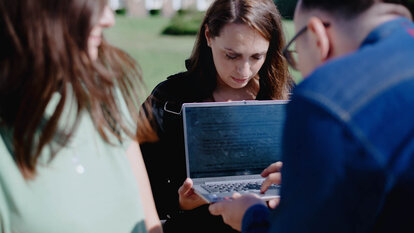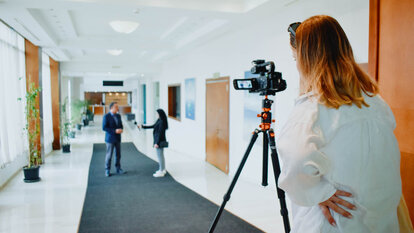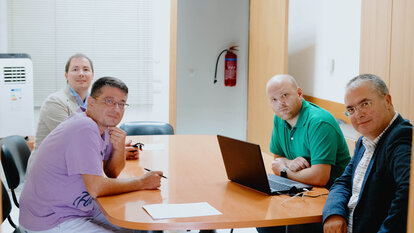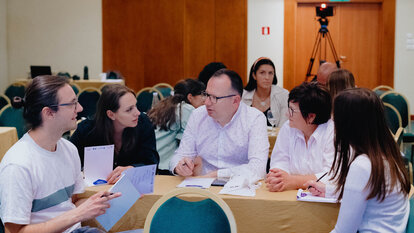Journalism
Cross-Border Journalism Training
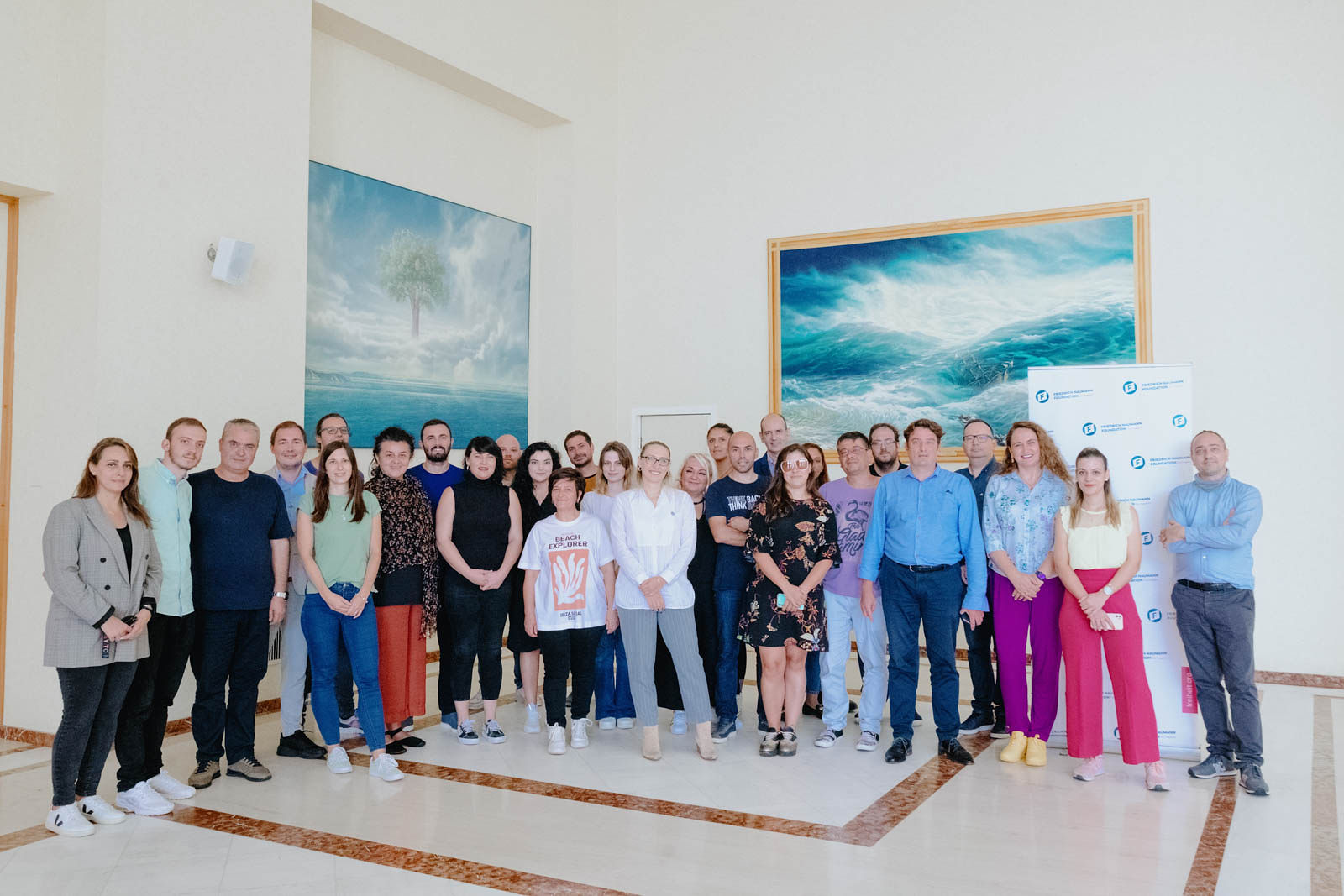
Journalists from Kosovo, North Macedonia, Bulgaria, and the Region of Eastern Macedonia and Thrace were gathered in Alexandroupoli from 25 to 29 September, as part of the training programme in cross-border journalism.
The programme was supported by the Friedrich Naumann Foundation for Freedom Greece and Cyprus and coordinated in cooperation with the Digital Communication Network Global and the Peace Journalism Lab of the Aristotle University of Thessaloniki.
More than 25 journalists had the opportunity to attend workshops by expert facilitators and mentors. The topic of the sessions covered both skills development and an overview of new trends in the field of journalism. In addition to the training modules, participants formed teams to produce journalistic content on issues related to the region. For the implementation of the Projects, the teams chose one of the three directions (a) port & energy, (b) culture & tourism, (c) and entrepreneurship by meeting local representatives. At the same time, they had the opportunity to attend the inauguration of the collaborative space of the Light Hub of the Evros Chamber and to interview local institutions and experts.
What Happened: Day 1
On the first day of the programme on September 26th, the first session was on developing narrative content, while the second session covered public relations and interpersonal issues for professional journalists.
The programme was opened by Alona Tatarova, Project Coordinator of the Friedrich Naumann Foundation for Greece and Cyprus who reported on the identity, work, and contribution of the Foundation in Greece and the world.
The first presentation was made by Professor and President of DCN Global Dr. Nikos Panagiotou, together with the expert in communication and marketing Mr. Leonidas Skerletopoulos. The topic of the module was the development of narrative content or "storytelling" as defined by the international term. The definition and concept of narrative content and the possibilities of storytelling in the digital world (transmedia storytelling) were developed, providing good practices and tools. The first session concluded with a presentation by Kostas Ordoubozanis, visual artist, who introduced the audience to theory and practical techniques for enhancing storytelling through visualisation in social media. Colors, shooting angles, characters, and basic photography theory in relation to social media philosophy and user behavior were the key features of Kostas Ordoubozanis presentation.
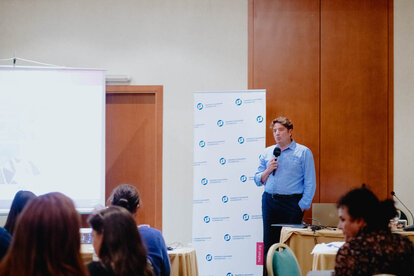
The second session started with a presentation by Professor Remzie Shahini-Hoxhaj, who also serves as the director of the Media Institute at the University of Pristina, Kosovo. Ms. Shahini-Hoxhaj, focused on public relations as a tool for professional journalists in telling their stories. She was followed by Arben Fetoshi - also a member of the Media Institute - developing positions on journalism in the current era in the light of cultural diversity in the media in relation to contemporary politics.
The first day was completed with a visit to the inauguration of the collaborative space of the entrepreneurship support structure (Light Hub) of the Evros Chamber of Commerce. At the end of the inauguration, a networking event was held at the Light Hub where the participants had the opportunity to talk to local entrepreneurs, representatives of institutions, guest mentors, and beneficiaries of the support structure.
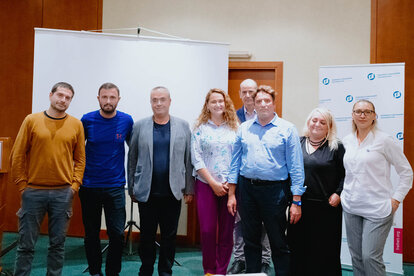
What Happened: Day 2
The programme of the second day focused mainly on thematic units on contemporary trends in journalism and the media in general, while the third part involved group work for the preparation of the material.
The first session was opened by Sophia Papadopoulou, editor-in-chief at APE-MPA, developing the concept of "engaged journalism". In this session, Sophia Papadopoulou focused on the connection between journalistic organizations and citizens in the era of digital networking and communication. The session concluded with a presentation by Dren Greguri who presented topics of news confirmation and cross-border journalism.
The second session presented new forms of journalism and elements of innovation in the industry. Dimiter Kenarov, a journalist from Bulgaria developed the concept of immersive journalism, in the sense that new technologies can be used to create better storytelling.
Andreas Panagopoulos, journalist and digital projects and events manager at Alter Ego media, spoke about the challenges of journalism in an environment dominated by mobile devices, and especially how this phenomenon can be exploited by mobile journalism. The general framework was presented while the participants had the opportunity to learn about the field through applied practices in Greece.
During the rest of the second day, the participants worked in groups, with activities such as interviews, taking shots, and photos in order to process them for the production of the final material for evaluation and observations.
Upon completion of the activities, participants and facilitators attended a lunch hosted by the Evros Chamber of Commerce.
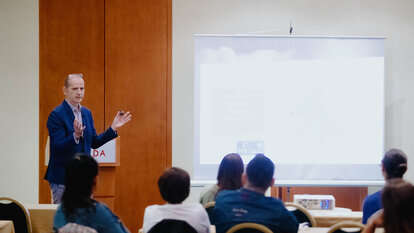
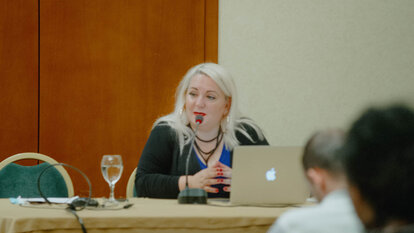
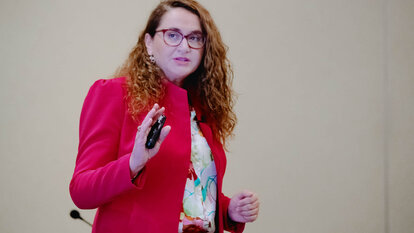
What Happened: Day 3
The third day had an educational session, and free time for working in groups, to prepare the material and presentation of their projects.
In the educational session, linking all the previous sessions and under the scope of a strategic approach, John Kotsifos, Director of the Union of Editors of Macedonia-Thrace (ESEMTH), focused on innovation, pointing out distortions and points that create obstacles to its achievement. This was followed by a time for working in groups.
The presentation of the projects started at noon with the workshop facilitators as judges, who gave feedback to each group on the material presented. All groups were required as a minimum to present material with text and audio-visual material for use across multiple platforms, and there was freedom to develop further material.
The project proved to be an important opportunity to foster partnerships, strengthen skills and create an important network to promote cross-border cooperation. This cooperation through networks of journalists can be the nucleus for the development of similar networks in other sectors with journalism and media being at the forefront.
